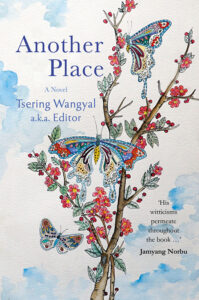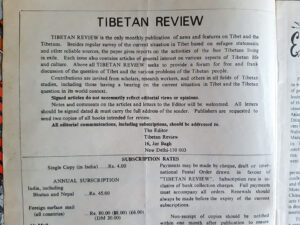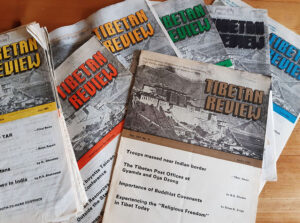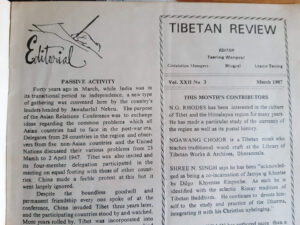Tsering Wangyal – 6 March 1949 – 24 November 2000
Editor – Tibetan Review – Sep 1976 to Aug 1996
Author – Another Place – OUT NOW!

Photo: Wikipedia
I was lucky enough to call Tsering Wangyal – always affectionately known as Editor – a friend around 35 years ago. To me, he was someone to sit up with for half the night putting the world to rights, and someone who inspired me to support the Tibetan cause. He will be remembered by most for his twenty years of stewardship of the Tibetan Review. “He and his predecessor, Professor Dawa Norbu, turned a magazine into a venerated institution of the Tibetan exile world and created a whole new generation of Tibetans: the TIBgotes or the Tibetan Review generation of Tibetan exiles. A generation born in Tibet, educated in exile and using the forum provided by the Review to discuss how to redeem its lost inheritance”: the words of Thubten Samphel, then of the Department of Information and International Relations, CTA, in his obituary for Editor, saying he is “survived by his quick wit, his irreverent humour, and his prodigious output in the Tibetan Review.”

Photo: Blackneck Books
Unbeknown to anyone at the time, Editor wrote a novel when he emigrated to Canada, where he ended his days. The manuscript came to light only recently and the book, Another Place, has been published by Black Neck Books at Tibet Writes, to the delight of anyone who knew him, anyone who likes to think of life in McLeod Ganj, anyone interested in Tibet and Tibetans and, indeed, anyone who loves life itself. It’s all in there: people, Tibet, friendship, loyalties, love…a book to read at one sitting and then go straight back to page one and start again.
Bhuchung Sonam, the writer and poet who initiated the book’s publication, writing in the Canada Tibet Journal says “Tsering Wangyal had an uncanny power over words that came with mathematical precision, quick wit and irreverent humour.”
I first met Editor at the hostel in Jor Bagh in south Delhi in the 1980s where he was living and where he and his companions would thrash me hollow at Scrabble despite my posh English education, before settling down to watch Star Wars and Monty Python.

Photo: J James/Contact
He showed me around his room…. “here’s my kitchen” in one corner, “here’s my office” (large desk covered in papers, typewriter and so on), “my library, my dining room”, and so on, til, to my astonishment he opened a cupboard to show me his record collection which tallied almost exactly with mine: a seemingly random collection of rock and pop and classical. Editor’s room was a hub for the Tibet movement, and his friendship and the evenings spent chatting to people from all over the world who gathered there to talk about Tibet, China, human rights, and life, were very special and an inspiration that has remained with me. It’s no coincidence that I have been involved in campaigning ever since, and during those years of crusading have put what I learned from Editor into practice, using the power of the written word to get that message across, and understanding the importance of making connections.
In McLeod we shared many a beer at the Hotel Tibet; returning after 30-odd years I’ll swear the tables and chairs are the very ones we sat at then, maybe even the tablecloths….

Photo: J James/Contact
Back home in England my monthly treat was the arrival through my letterbox of the Tibetan Review, airmail edition. No instant communications and news reports online in those days. That printed magazine would wend its way round the world to keep us all in touch with Tibetan issues and of course Editor’s way with words and his legendary editorials kept us entertained and inspired to support the cause.
But I knew little of his background. Jamyang Norbu takes up the story, writing in his blog Shadow Tibet.
Tsering Wangyal was born in Kalimpong; his father was a Khampa from Drayab and his mother was Lhasa born. Tsering was the oldest of nine siblings and he attended the Kumudini Homes High School, graduating in 1966 and going on to work in Dharamshala at the Religious Department. In 1968 he was selected for further studies in Britain and on returning to Dharamshala he worked for the exile administration before taking over the editorship of the Tibetan Review.
His takeover of the Tibetan Review coincided with momentous political events, not only for the world but for Tibetans as well: the end of the Cultural Revolution, Nixon’s trip to China, the death of Mao, the arrest of the Gang of Four, Deng Xiaping, the liberalisation of China’s economy and, most important of all for us, the opening up of Tibet.

Photo: J James/Contact
In his editorials and articles Editor was ready to take on the exile government and other players over political questions he felt they had mishandled or neglected, while always strict about facts.
In his blog, Jamyang quotes Thupten Samphel, with his description of Editor’s “idiosyncratic writing method, style and his underlying journalistic skill and integrity”; Thupten Samphel: “Editor used his massive office Remington typewriter with thundering rage. He pulled no punches, both against what he perceived as Tibetan government bungling and China’s unrelenting assault in Tibet. In the end the image remains of Editor, shirtless, pounding on the Remington typewriter with his rapid, flowing two fingers, to produce his spontaneous, angry editorials which became the delight of the public and dismay of authorities.”
The Tibetan Review was owned by the Information Department of the Tibetan exile government but Editor had insisted on editorial independence when he took over: Jamyang says the Kashag ministers of the time recognised the value of a critical English language journal.
Order your copy of the book at Blackneck Books, they can post anywhere in the world.




 Print
Print Email
Email













